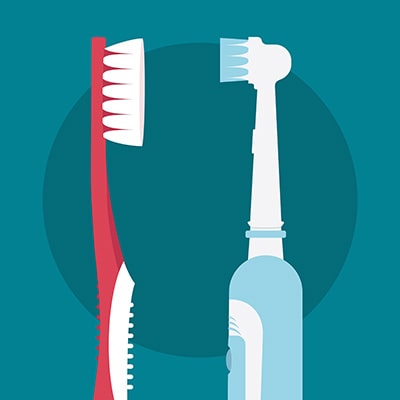Which toothbrush to use?
The aim of the toothbrush is to remove plaque (Biofilm) on the entire surface of the teeth: plaque is composed of bacteria, which cannot be killed with products such as toothpaste or mouthwash. The only way of removing plaque is a mechanical action: brush the teeth to unstick the plaque. Plaque is highly adherent on surfaces. You must brush for long enough. Nevertheless, you mustn’t brush too hard in order not to damage the teeth or gum.
Choosing the right toothbrush is therefore particularly important.

A soft or hard brush?
The use of a soft brush is recommended for 2 reasons:
- The soft bristles of the brush can fold and follow the contours of the teeth. This way the brushing is more efficient than with a medium or hard bristles which would not bend and clean in the hollows.
- The softness of the bristles means the teeth and gums do not get damaged.
Tip: the soft brushes sold in supermarkets or pharmacies have bristles that are around 20/100th of a mm. This is not supple enough. We advise the use of a brush with bristles that are 15 to 18/100th of a mm.
Request a dental check-up
BOOK AN APPOINTMENT
Manual or electric toothbrush?
Brushing your teeth demands precision and the time of brushing long enough to unstick all the plaque. Electric toothbrushes are a real asset in obtaining an efficient brushing in a reasonable timeframe (2 minutes). Two models exist:
- Rotating and oscillating: the head is round and turns on an axe. The speed of rotation is very high and will perform a lot of back and fourths on the surface of the teeth, enabling the removal of plaque in record time!
- The sonic toothbrushes: the head of the brush resembles that of a manual toothbrush and vibrates. The vibration helps to remove plaque more efficiently.

Our recommandations
Even with a soft brush it is important to have a gentle hand whilst brushing to prevent damaging the teeth (wearing of the enamel) or the gum. Brushing too hard can cause recessions: the gum retracts, and the root of the tooth becomes apparent which will lead to an aesthetic problem and sensitivity to heat and cold.
Whichever the toothbrush that you choose it is vital to use it with precision (learn the technique with your dentist) and complete the brushing by using dental floss or interdental brushes.
To determine which toothbrush will suit you best talk to your dentist.







